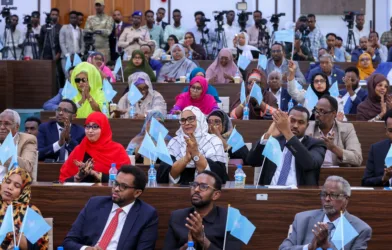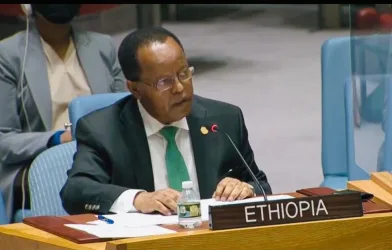 Secretary-General Ban Ki-moon today called on the world to adopt a new approach to bring peace to Somalia, telling an international conference on the Horn of Africa country that a failure to act now risks expanding the violence to its neighbours and beyond.
Secretary-General Ban Ki-moon today called on the world to adopt a new approach to bring peace to Somalia, telling an international conference on the Horn of Africa country that a failure to act now risks expanding the violence to its neighbours and beyond.
“One thing is certain. If we do not change our approach, there will be little chance for peace in Somalia,†he told the conference, citing the urgent needs to give humanitarian aid to 3.2 million people, set up a legal framework to bring pirates operating off the Somali coast to justice, and accelerate reconstruction by involving the Somali business community at home and abroad.
The three-day international conference, being held in Istanbul and co-hosted by the United Nations and Turkey, is examining Somalia’s political, security and reconstruction needs, a year after a similar summit was held in Brussels.
“We are here today to start making that change – by considering the challenges Somalia faces and the opportunities it presents,†Mr. Ban said.
He warned that continuing conflict in Somalia – “one of the world’s most intractable crises [where] for 20 years conflict over power, resources and land has destroyed lives, created hundreds of thousands of orphans and devastated communities†– is attracting extremist elements from outside the country and radical young Somalis from the diaspora, posing a threat to Somalia, neighbouring countries and beyond.
The humanitarian crisis is dire with 3.2 million people, more than 40 per cent of the population in need of aid, 1.4 million of them internally displaced persons (IDPs). “I urge the international community to do everything possible to make sure they receive the help they need,†he said.
Turning to rampant piracy off the Somali coast, in which dozens of ships, including those carrying UN food aid, have been seized, Mr. Ban said he would submit a report on options for prosecuting and imprisoning the pirates within three months as requested by the Security Council. He also urged the donor community and the shipping industry to contribute generously to a UN Trust Fund set up to support prosecution of suspects.
“But despite these serious problems, it is not too late. We must recognize the opportunities in the current situation,†he noted, stressing that for the first time in two decades, when Somalia last had a functioning central government, there is some progress towards stability, with former adversaries participating in an internationally recognized Transitional Federal Government (TFG).
Despite some internal divisions, this Government has survived repeated attacks by extremists, and remains committed to peace and reconciliation, he added, citing a recent cooperation accord with the moderate Ahlu Sunna Wal Jammah group as a blueprint for other opposition groups to build on.
“The Transitional Federal Government represents Somalia’s best chance in years to escape from the endless cycle of war and humanitarian disaster,†he said. “The only way to restore stability is to support this Government, both in its reconciliation efforts and, where necessary, its fight against extremism. If the international community acts now, we can make a difference.â€
In return, he urged the Somali authorities to demonstrate the will and commitment to work together, resolve internal disputes, unite against the threat of extremism, and start to deliver improved services to the Somali people, pay salaries to the security forces and continue efforts to build up security sector institutions.
Turning to the final pillar is reconstruction, he called the Somali business community a large part of the answer, “Somalia’s business leaders, both inside the country and in the diaspora, are one of its main assets,†he said. “They should play a key role in the reconstruction phase of the peace process.
“I fully support calls for a compact between the international community, as represented by the United Nations, the business community, and the TFG. I urge this conference to back this proposal,†he added, emphasizing that one of its most important aims must be to generate jobs, particularly for young people, and give them an alternative to joining armed extremist groups or piracy.
“Helping Somalia to recover is clearly a significant challenge,†he concluded. “But it is not insurmountable.â€
UN News
World must adopt new approach to bring peace to war-torn Somalia, says Ban
Published: May 22, 2010







